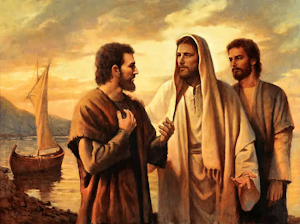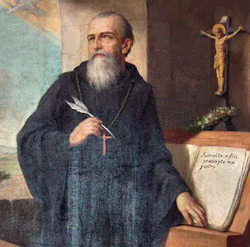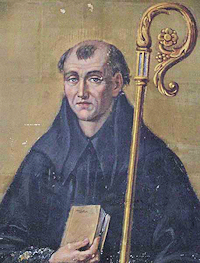Easter: April 17th
Monday of the Second Week of Easter
Other Commemorations: St. Robert of Molesme, Abbot (RM)
» Enjoy our Liturgical Seasons series of e-books!
We continue in our Easter joy in the Second Week of Easter, as in the Preface I of Easter "overcome with paschal joy, every land, every people exults in your praise."
The Roman Martyrology commemorates St. Robert Molesme (1027-1110), traditionally considered to be the founder of the Cistercians, the reform that developed at Citeaux.
Meditation—The Fruits of Our Lord's Resurrection
Yes, my dear brethren, all these things are true. Our Lord rose again in glory; He entered again into that glory that was His by nature with the Father before the world was made. Through His obedience unto death, God hath exalted Him and given Him as man that Name which is above every name, that at the Name of Jesus every knee shall bow and every tongue confess that Jesus is the Lord to the glory of the Father. And He is now ever seated at the right hand of the Father, making intercession for us.
 And not merely in the highest heavens, as it were afar off. He sheds His mercies broadcast on the earth. As He forgave sins, He gave to others on earth as His ambassadors that same power. Later, by the lakeside, we see Him giving a charge to St. Peter: "Feed My lambs, be shepherd of My lambs: feed My sheep." And since then there have been many shepherds, striving as Our Lord Himself to be good shepherds and distributing His bounties. And once again by that great commission He sends forth the fruits of His Resurrection: "All power is given Me in heaven and on earth. As the Father bath sent Me, so do I send you. Going, teach, baptize . . . and I am with you till the consummation of the world." As St. Gregory comments on this passage: "As the Father hath sent Me, so send I you; that is, as the Father who is God bath sent Me who am God, so I who am Man send you who are men." In this way, whilst going before to prepare many mansions above for His faithful, He provides for us wayfarers on the earth every help and consolation and joy abundant.
And not merely in the highest heavens, as it were afar off. He sheds His mercies broadcast on the earth. As He forgave sins, He gave to others on earth as His ambassadors that same power. Later, by the lakeside, we see Him giving a charge to St. Peter: "Feed My lambs, be shepherd of My lambs: feed My sheep." And since then there have been many shepherds, striving as Our Lord Himself to be good shepherds and distributing His bounties. And once again by that great commission He sends forth the fruits of His Resurrection: "All power is given Me in heaven and on earth. As the Father bath sent Me, so do I send you. Going, teach, baptize . . . and I am with you till the consummation of the world." As St. Gregory comments on this passage: "As the Father hath sent Me, so send I you; that is, as the Father who is God bath sent Me who am God, so I who am Man send you who are men." In this way, whilst going before to prepare many mansions above for His faithful, He provides for us wayfarers on the earth every help and consolation and joy abundant.
Thus, as the Angel predicted, all flesh shall see the salvation of God —all who will take it to themselves. Thus are we redeemed, thus reinstated; thus given supernatural life, with a right to eternal life. Now, above all things, we have ready access to the throne of the Most High. We may exclaim: "O God, awful in purity, terrible in majesty, we draw near, mindful indeed of our past coldness and neglect, of past sin; mindful of our low estate; and yet with all confidence, with the joy and freedom of children. Remember our dignity, for we are bought with a great price; remember our frailty but to extend Thy hand in succor." Today as we gather round the priest at the altar—the altar whereon the Precious Blood of Calvary continues to flow—we offer to God a worthy adoration, a worthy expression of gratitude: we are given the grace to repent and our repentance is accepted; and every other grace we ask through the merits of our Risen Saviour will assuredly be ours.
—S. Anselm Parker, O.S.B., M.A., excerpted from The Message of the Gospels
St. Robert of Molesme
 St. Robert was born in 1027 near Troyes, Champagne, France, of noble birth. At age 17 he entered the Benedictine Abbey Montier-la-Celle, quickly rising to be prior of the abbey. He was made Abbot of Saint-Michel-de-Tonnerre in 1070, but considered it to have lax standards and the monks were quarrelsome, so he returned to Montiers-la-Celle. The same year he was placed over the priory Prior of Saint-Ayeul Abbey, which was connected to Montiers-la-Celle.
St. Robert was born in 1027 near Troyes, Champagne, France, of noble birth. At age 17 he entered the Benedictine Abbey Montier-la-Celle, quickly rising to be prior of the abbey. He was made Abbot of Saint-Michel-de-Tonnerre in 1070, but considered it to have lax standards and the monks were quarrelsome, so he returned to Montiers-la-Celle. The same year he was placed over the priory Prior of Saint-Ayeul Abbey, which was connected to Montiers-la-Celle.
In 1075, in an attempt to return to a simpler form of Benedictine life requested by a group of hermits from the forests around Colan, France, he helped found the monastery at Molesme, Burgundy. The group, especially Robert, gained a reputation for piety. It is because of this reputation that in 1082 St. Bruno of Cologne came to Robert seeking advice. He lived with Robert's community for a time before going on to found the Grande Chartreuse, the first Carthusian monastery. , The growing reputation led to bequests of money, which led to an increase in size of the monastery, which led to internal difficulties, and suddenly there were many brothers that objected to the severe life practiced by the founders. Robert twice left to live on his own, but was ordered back to his position by the pope.
In early 1098 Robert, Saint Stephen Harding, Saint Alberic of Citeaux and 18 other monks left Molesme, and on March 21, they founded the monastery of Cîteaux near Dijon, France, with the goal of living strictly by the Benedictine Rule, strict vows of poverty, and frequent retreats; Robert served as the first abbot. However, with conditions deteriorating at the Molesme house he was re-assigned as abbot there in 1100 with a mandate to reform. The monks agreed to submit entirely to his interpretation of the Rule of St. Benedict. Molesme became a major center for the Benedictines under his tutelage. St. Albéric was made successor abbot at Cîteaux, with St. Stephen Harding as prior. St. Robert lived and worked in Molesme the rest of his life.
St. Robert is traditionally considered one of the founders of the Cistercians, the reform that developed at Citeaux.
—Adapted from Catholic Saints Info and Catholic Encyclopedia
Highlights and Things to Do:
- Read more about St Robert of Molesme:
- St. Robert's first founded Molesme Abbey, which now is only an historical monument, with a few surviving buildings. See more about the Shrine of Our Lady of Molene on that site.
- With St. Stephen Harding, St. Robert founded Citeaux Abbey. It was an activity monastery for the Cistercians (Trappists) until the French Revolution. In 1898 it was bought back by the Trappists and revitalized. More details can be read on Wikipedia.
- Read this brief guide on the Cistercian Order.
- See some art depictions of St. Robert.






